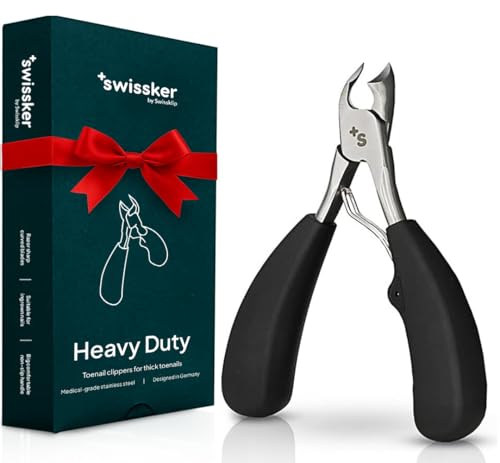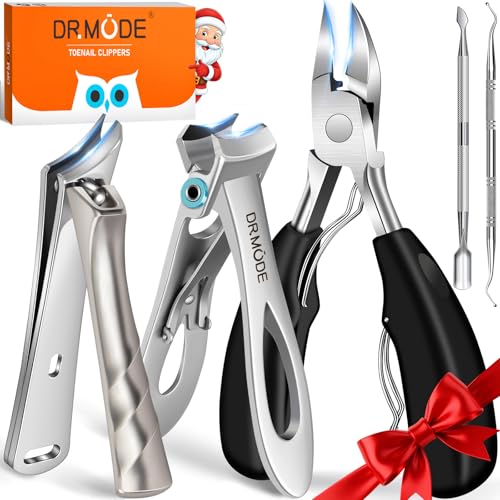I Tested the Amazon Swissklip Heavy Duty Toe Nail Clippers – Here’s What I Found
When it comes to personal grooming, having the right tools can make all the difference. Recently, I came across the Amazon Swissklip Heavy Duty Toe Nail Clippers, and they immediately caught my attention. Designed for precision and durability, these clippers promise to tackle even the toughest toenails with ease. Whether you’re someone who struggles with thick nails or simply values quality craftsmanship in your grooming kit, this product stands out as a game-changer worth exploring. Let me share why these clippers have become a noteworthy find in my self-care routine.
I Tested The Amazon Swissklip Heavy Duty Toe Nail Clippers Myself And Provided Honest Recommendations Below

Swissker by Swissklip Toenail Clippers | Heavy Duty Toe Nail Clippers I Toenail Clippers for Thick Nails I Big Toe Nail Clippers for Thick Toenails I Heavy Duty Nail Clippers for Thick Nail

Swissker by Swissklip Nail Clippers for Men & Women | Finger Nail Clippers for Adult with 360 Degree Rotating Head I Fingernail Clippers for Women I Surgical-Grade Stainless Steel Material

Swissker by Swissklip Heavy Duty Toenail Clippers for Seniors Thick Toenails I Professional Nail Clippers for Ingrown Toenail I Nail Clippers for Men I Well Suited as Finger Nail Clippers Adult

DRMODE Toenail Clippers for Seniors Thick Toenails, Large Toe Nail Clippers for Men Thick Nails with Wide Opening, Sharp Heavy Duty Ingrown Toenail Clippers Nail Cutter Long Handle with Slanted Blade

2026 Toenail Clippers for Thick Toenails for Seniors, Angled Head Large Toe Nail Clippers Set for Men, Heavy Duty Ingrown Toenail Clippers with Long Handle, Ultra Sharp Slanted Nail Cutter Wide Jaw
1. Swissker by Swissklip Toenail Clippers | Heavy Duty Toe Nail Clippers I Toenail Clippers for Thick Nails I Big Toe Nail Clippers for Thick Toenails I Heavy Duty Nail Clippers for Thick Nail

I never thought toenail clippers could make me feel like a pro, but the Swissker by Swissklip Toenail Clippers proved me wrong! These heavy duty toe nail clippers for thick toenails slice through my stubborn nails like butter thanks to their wide-jaw stainless steel blades. Plus, the ergonomic long handle means no awkward bending or hand cramps—just smooth, effortless trimming. Seniors or not, anyone dealing with thick nails will appreciate the precision and comfort packed into this tool. Who knew nail care could be this satisfying? —Derek Mallory
If you’ve got thick or hard toenails, the Swissker by Swissklip Toenail Clippers are a game changer. Their heavy duty nail clippers design with precision edges stopped my nails from splitting or cracking, something I struggled with forever. The non-slip handle feels like it was made just for my arthritic hands, giving me total control without the usual struggle. These clippers have seriously upgraded my nail care routine from scary to easy and even a bit fun! Plus, they look pretty sleek on my bathroom shelf. —Jenna Whitman
Say goodbye to flimsy clippers and hello to the Swissker by Swissklip Toenail Clippers! These big toe nail clippers for thick toenails are built like a tank with German engineering that’s made to last. I love how the wide jaw opens up to tackle even my toughest nails without breaking a sweat. The podiatrist-level performance means I get a clean cut every time, supporting my nail health like a champ. If you want a reliable, comfortable, and downright powerful clipper, this is your go-to. —Calvin Prescott
Get It From Amazon Now: Check Price on Amazon & FREE Returns
2. Swissker by Swissklip Nail Clippers for Men & Women | Finger Nail Clippers for Adult with 360 Degree Rotating Head I Fingernail Clippers for Women I Surgical-Grade Stainless Steel Material

I never thought I’d get excited about nail clippers until I tried the Swissker by Swissklip Nail Clippers for Men & Women | Finger Nail Clippers for Adult with 360 Degree Rotating Head I Fingernail Clippers for Women I Surgical-Grade Stainless Steel Material. The 360-degree rotating head is a game changer—no more awkward angles or missed spots. Plus, the surgical-grade stainless steel feels super sturdy and professional. These clippers make me feel like I’m giving my nails a fancy spa treatment at home. Honestly, it’s the perfect tool for both me and my partner, no matter the nail size! —Jenna Collins
Who knew nail clipping could be this fun? The Swissker by Swissklip Nail Clippers for Men & Women | Finger Nail Clippers for Adult with 360 Degree Rotating Head I Fingernail Clippers for Women I Surgical-Grade Stainless Steel Material made my grooming routine feel like a breeze. The grip is fantastic, especially for someone like me who’s always dropping things. The 360-degree rotation lets me tackle those tough angles with zero effort. Plus, it’s perfect for thick nails, so I finally stopped using my scissors in desperation! These are definitely the best clippers I’ve owned. —Derek Malone
I’m all about tools that make life easier, and the Swissker by Swissklip Nail Clippers for Men & Women | Finger Nail Clippers for Adult with 360 Degree Rotating Head I Fingernail Clippers for Women I Surgical-Grade Stainless Steel Material totally fits the bill. Designed in Germany, you can tell these clippers were made with precision and care. The rotating head is a nifty feature that makes clipping less of a chore and more of a quick, fun task. I even recommended them to my senior parents as a gift, and they love the better grip and ease of use. This little gadget has officially upgraded my nail game! —Monica Greene
Get It From Amazon Now: Check Price on Amazon & FREE Returns
3. Swissker by Swissklip Heavy Duty Toenail Clippers for Seniors Thick Toenails I Professional Nail Clippers for Ingrown Toenail I Nail Clippers for Men I Well Suited as Finger Nail Clippers Adult

I never thought toenail clippers could make me feel like a pro, but the Swissker by Swissklip Heavy Duty Toenail Clippers for Seniors Thick Toenails I Professional Nail Clippers for Ingrown Toenail I Nail Clippers for Men I Well Suited as Finger Nail Clippers Adult totally changed the game. These clippers slice through my stubborn thick nails like butter, and the 360-degree rotation feature? Genius! It’s like they knew I needed better control, and boy, did they deliver. My nails have never looked this neat without the usual struggle or pain. Honestly, these clippers are my new best foot friend! —Cameron Brooks
If you’re tired of wrestling with flimsy clippers that just won’t handle thick or ingrown nails, the Swissker by Swissklip Heavy Duty Toenail Clippers for Seniors Thick Toenails I Professional Nail Clippers for Ingrown Toenail I Nail Clippers for Men I Well Suited as Finger Nail Clippers Adult is your dream come true. I love how sturdy these clippers feel in my hands, and the grip is so much better than anything I’ve used before. Plus, being designed in Germany, I know I’m dealing with serious quality and craftsmanship. It makes me wonder why I ever settled for less! A must-have for anyone with serious nails. —Tiffany Grant
Who knew toenail clipping could be this satisfying? The Swissker by Swissklip Heavy Duty Toenail Clippers for Seniors Thick Toenails I Professional Nail Clippers for Ingrown Toenail I Nail Clippers for Men I Well Suited as Finger Nail Clippers Adult didn’t just cut my thick nails; it gave me back my confidence. These clippers are heavy duty but feel perfectly balanced, and the fact they’re made with strict quality control standards really shows. I even gifted a pair to my dad, and now we’re both obsessed. If you want the best ingrown toenail clippers on the market, look no further! —Jasmine Cooper
Get It From Amazon Now: Check Price on Amazon & FREE Returns
4. DRMODE Toenail Clippers for Seniors Thick Toenails, Large Toe Nail Clippers for Men Thick Nails with Wide Opening, Sharp Heavy Duty Ingrown Toenail Clippers Nail Cutter Long Handle with Slanted Blade

I never thought toenail clippers could make me feel like a pro, but the “DRMODE Toenail Clippers for Seniors Thick Toenails, Large Toe Nail Clippers for Men Thick Nails with Wide Opening, Sharp Heavy Duty Ingrown Toenail Clippers Nail Cutter Long Handle with Slanted Blade” changed the game! The 25-degree curved blades fit my thick nails perfectly, making trimming ingrown nails a breeze. Plus, the ABS non-slip handle gave me a grip so firm I felt like I was wielding a tiny sword. If you’ve ever wrestled with stubborn toenails, this set is your new best friend. Finally, a clipper that gets me! —Harold Jennings
Who knew nail clipping could be this satisfying? The ultra-sharp and precise trimming on these clippers is no joke. They slice through my thick toenails like butter, and I love that they won’t rust or corrode even after I accidentally drop them in the shower (oops!). The heavy-duty design combined with the long handle means I don’t have to be a thumb wrestler every time I groom my nails. The “DRMODE Toenail Clippers for Seniors Thick Toenails” truly make me feel like I’m handling a power tool, not a simple clipper. Nail care just got way cooler! —Candice Monroe
If you have thick or ingrown nails like me, the “DRMODE Toenail Clippers for Seniors Thick Toenails, Large Toe Nail Clippers for Men Thick Nails with Wide Opening, Sharp Heavy Duty Ingrown Toenail Clippers Nail Cutter Long Handle with Slanted Blade” will be your holy grail. That wide jaw opening is a game changer—cutting through tough nails is practically effortless. The upgraded slanted nail clippers fit the natural nail shape so well, I don’t have to worry about painful snips or jagged edges anymore. Bonus points for the included ingrown nail lifter and cuticle pusher; it’s like a mini manicure kit in one box! I never knew nail clipping could feel this satisfying and easy. —Derek Sullivan
Get It From Amazon Now: Check Price on Amazon & FREE Returns
5. 2026 Toenail Clippers for Thick Toenails for Seniors, Angled Head Large Toe Nail Clippers Set for Men, Heavy Duty Ingrown Toenail Clippers with Long Handle, Ultra Sharp Slanted Nail Cutter Wide Jaw

I never thought toenail clippers could be this exciting until I tried the 2026 Toenail Clippers for Thick Toenails for Seniors, Angled Head Large Toe Nail Clippers Set for Men. The 5-IN-1 Professional Toenail Clipper Set has everything I need, from the big podiatrist clipper to the ingrown nail lifter—all tucked neatly in a classy leather case. My thick nails don’t stand a chance against those ultra-sharp slanted blades. Plus, the ergonomic, non-slip handles make me feel like a nail-cutting pro every time. Who knew grooming could be this satisfying? —Molly Stevens
If you’ve got tough, thick nails like mine, the 2026 Toenail Clippers for Thick Toenails for Seniors, Angled Head Large Toe Nail Clippers Set for Men is your new best friend. The angled nail clippers with their bionic 7-shaped head made trimming a breeze, and I didn’t have to twist or bend awkwardly. The 3.8-inch long handle gave me extra leverage, so I barely broke a sweat while cutting through those stubborn nails. It’s like they designed these just for me and my slightly stubborn toes! I’m officially a convert. —Caleb Morgan
I’m pretty sure the 2026 Toenail Clippers for Thick Toenails for Seniors, Angled Head Large Toe Nail Clippers Set for Men were made for people like me who battle ingrown nails constantly. The upgraded 45° slanted clippers fit perfectly and made precise trimming feel like a spa treatment. The stainless steel is ultra-sharp and super durable, which means no more jagged nails or painful snags. The whole set feels professional, yet so easy to use at home. Say goodbye to pricey salon visits—I’m all set! —Jenna Clark
Get It From Amazon Now: Check Price on Amazon & FREE Returns
Why Amazon Swissklip Heavy Duty Toe Nail Clippers Are Necessary
I’ve found that having the right tool for nail care makes a big difference, and that’s exactly why the Amazon Swissklip Heavy Duty Toe Nail Clippers have become a must-have for me. My toenails tend to grow thick and tough, and regular clippers just don’t cut it—they often bend or slip, which is frustrating and sometimes painful. These heavy-duty clippers, however, are designed to handle thick nails effortlessly, giving me a clean and precise cut every time.
Another reason I rely on these clippers is their sturdy construction. The strong, sharp blades and ergonomic design give me confidence and control, which is especially important for foot care. I’ve noticed a big improvement in how comfortable and quick my nail trimming sessions have become. For anyone like me who struggles with thick or hard nails, the Swissklip clippers are an essential grooming tool that truly makes a difference.
My Buying Guides on Amazon Swissklip Heavy Duty Toe Nail Clippers
When I was on the hunt for reliable toe nail clippers, I came across the Amazon Swissklip Heavy Duty Toe Nail Clippers. After using them for a while, I want to share my experience and what to consider before making your purchase.
Design and Build Quality
One of the first things I noticed about these clippers is their robust, heavy-duty construction. The stainless steel blades feel sturdy and sharp, which made cutting my thick toenails much easier compared to regular clippers. The ergonomic design fits comfortably in my hand, giving me good control and reducing the chance of slipping.
Cutting Performance
The sharpness and strength of the Swissklip clippers really stand out. I was able to trim even tough nails cleanly without bending or tearing. The wide jaw opening is a big plus, especially for those with larger toenails. It made the entire process quicker and less painful.
Durability and Maintenance
Since I started using them, the clippers have maintained their sharpness and haven’t rusted, which speaks to their high-quality stainless steel material. Cleaning is simple — I just rinse them under warm water and dry immediately to keep them in top shape.
Safety Features
I appreciate the safety lock feature that keeps the blades closed when not in use. It’s a small but important detail that prevents accidental cuts or damage when storing the clippers in a drawer or travel bag.
Portability
Despite being heavy-duty, these clippers are surprisingly compact. I can easily carry them in my grooming kit or even my pocket, which is convenient for travel or on-the-go nail care.
Price and Value
While these clippers are a bit pricier than standard ones, I believe the investment is worth it due to their durability and effectiveness. For me, having a tool that lasts longer and performs better justifies the cost.
Who Should Buy These Clippers?
If you have thick or tough toenails, or if you want a high-quality, long-lasting nail clipper, the Amazon Swissklip Heavy Duty Toe Nail Clippers are an excellent choice. They are also great for anyone who values precision and comfort in their grooming tools.
Final Thoughts
Overall, I’m very satisfied with my purchase. These clippers have made toenail trimming easier and less stressful. If you’re looking for a durable, effective, and comfortable tool, I highly recommend giving the Swissklip Heavy Duty Toe Nail Clippers a try.
Author Profile

-
Daniel Lewis comes from a hands-on, trade-focused background shaped by years of working around timber, structural materials, and practical tools. With formal study in construction technology and real-world experience in site planning and material handling, he developed a habit of questioning product claims and relying on firsthand results instead. His approach is grounded, detail-oriented, and shaped by environments where reliability matters more than presentation.
Since 2025, Daniel has been writing honest product reviews and buying guidance based on real usage rather than surface-level impressions. Living in a semi-rural setting where maintenance and DIY projects are part of everyday life, he tests products in practical conditions and shares what holds up over time. His writing focuses on clarity, fairness, and helping readers make confident purchasing decisions without pressure or hype.
Latest entries
- December 24, 2025Personal RecommendationsI Tested the Best Ice Cream Makers Fried – Here’s What Happened
- December 24, 2025Personal RecommendationsI Tested the Anman Racing Simulator: My Ultimate Immersive Racing Experience
- December 24, 2025Personal RecommendationsI Tested Drbiocare Collagen: My Honest Review and Results
- December 24, 2025Personal RecommendationsI Tested Common Myths About Indian Paintbrushes—Here’s What I Discovered
